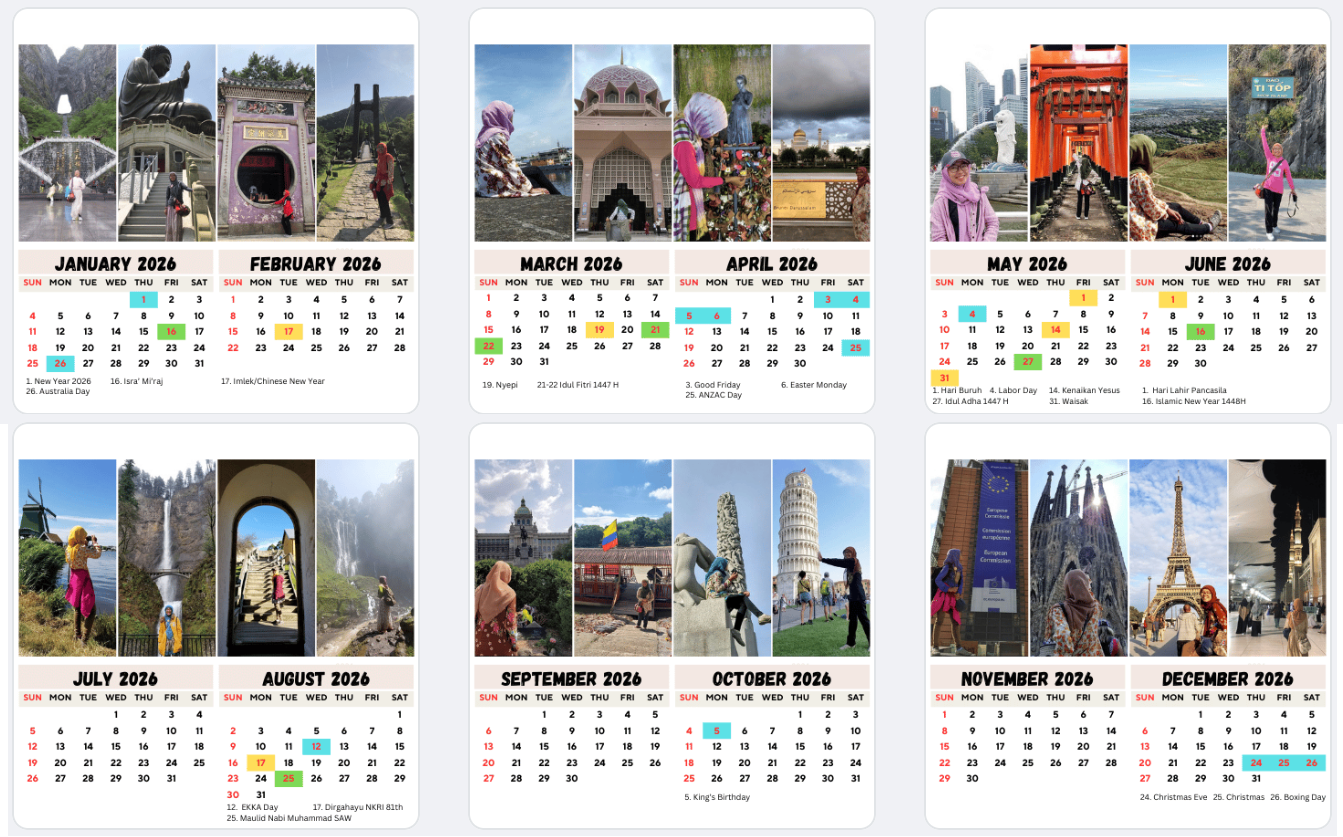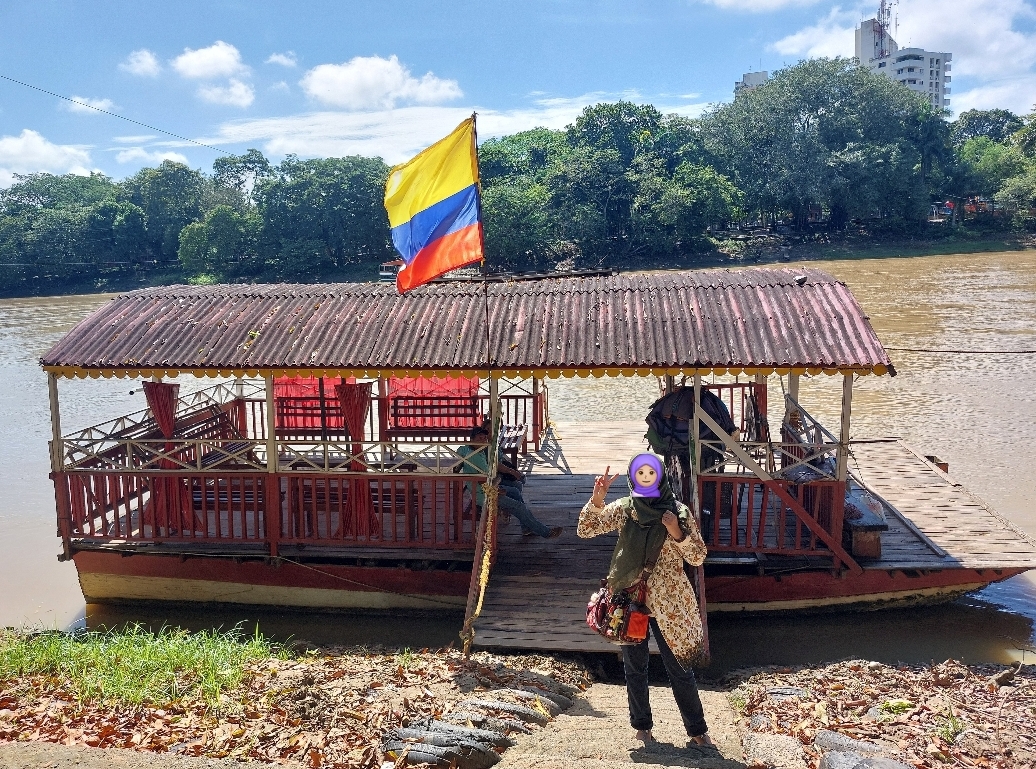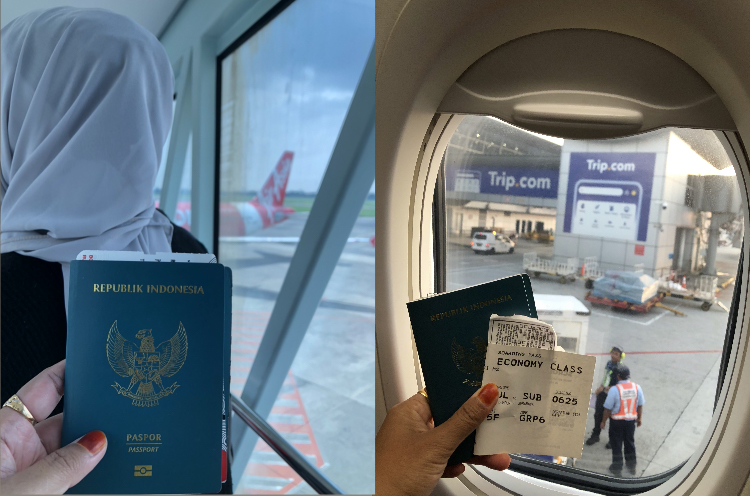
Hola! It’s the end of the month, and as I’ve made it imperative to try to post something at least once a month, here I am. I’ve been sharing some Chinese dramas/movies I watched, my experience applying for a Chinese visa, and now let me continue with sharing my experience traveling to China.
First of all, this is my personal take, so it might be subjective and I really don’t mean to generalize it or invalidate others experiencing something different. This is purely what I experienced, what I felt, and how I viewed it at that time. And maybe you can use it as additional reference before going to China yourself.
So, well, I went to China for around two weeks. I visited 5 cities: Beijing, Xi’an, Chongqing, Zhangjiajie, and Shanghai. I did plan to have a one-day trip to Chengdu from Chongqing, but then I decided to just stay in Chongqing. I planned to visit many cities because I needed a visa to go to China and I thought I wouldn’t go again so I really wanted to make the most of my visa by staying longer and visiting many places in one go. But boy, after traveling there, I JUST WANT TO VISIT AGAIN! You know I have always favored Japan, one country that I always want to come back to, but now you can add China to that list. Yes, it’s that amazing!
So, where do we go from here? What do you want to know?
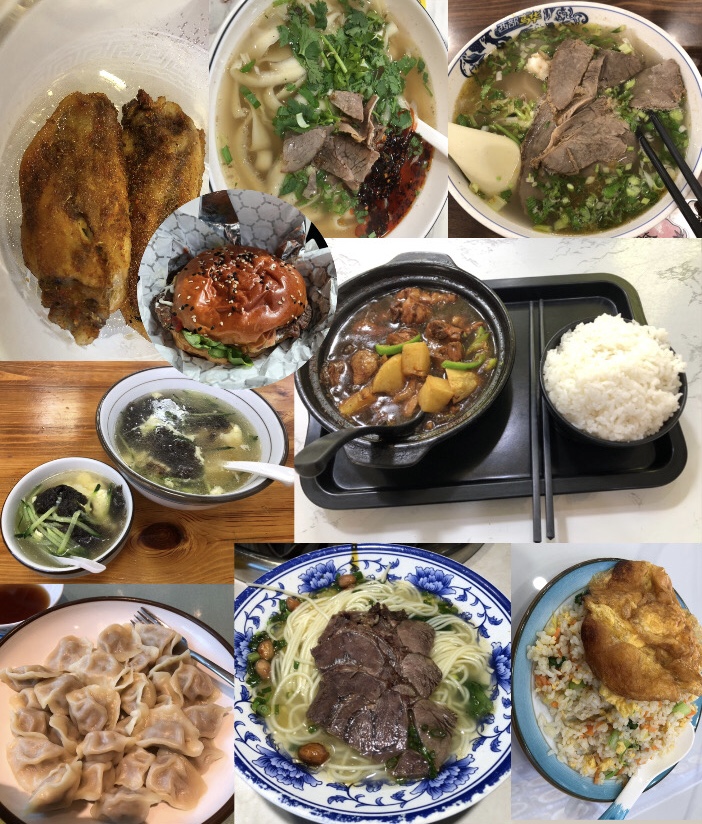
1. Arrival
I browsed that China wasn’t as strict as Taiwan. It allowed us to bring some food, so yes, I brought some food from home like some bread and cup noodles for my first day(s) in China so I didn’t have to go out just to eat upon arrival. The immigration officers were pretty nice too. I thought they’re going to problematize that I had an additional/different name on my passport endorsement page (if you read my Chinese visa application post, you’d know). I was actually anxious that they’d deny me entry, I printed my bank statements and employment certificate just in case, but thankfully I was lucky; all went well. They just took a look at my passport, visa page, and then asked for my return ticket from China. And that’s it.
The problem existed before and after that. Not really a problem, though, just a challenge. First, before passing the immigration office, they wanted us to submit our biometrics (fingerprints) using the provided machines, and it took so damn long time before I could find a machine that worked. I almost thought that the machines were broken, ’cause I wasn’t the only one experiencing it. Some people also tried one machine after another. I tried one and thought I’d succeeded only to find that it failed because when it came to my third finger, it wouldn’t read it and so it failed and I had to redo from the start. I tried several times, moved and tried another, until finally succeeded and got the proof of fingerprint registration printed to present to the immigration officer. I’m telling you this so when you go there and experience the same, you don’t need to panic. It’s normal.
Another challenge was the transport to my hostel. My flight to Beijing arrived a little after midnight, and the trains and buses only began to run in the morning. I could try to use Didi, like online taxi, but then I wanted to try the public transport, right? So I stayed in the airport waiting for the express train to town. (Not to mention private/online taxi is of course pricier). Telling you this for your consideration of your arrival time when you book your flight ticket.
2. Payment
Now you might have seen countless posts saying that in China, you’d better install Alipay or WeChat for payment ’cause they don’t accept cash. Well, they’re not entirely wrong. I mean, some of them still accept cash – but it’s inconvenient. Almost all vendors (stores, ticket machines, hostels, etc.) provide QR codes for Alipay and/or WeChat pay for payment, and it’s more convenient that way. Coming from Indonesia and getting used to using QRIS for payments, I actually don’t find this a problem. I found it really convenient. You just scan and pay. Just make sure you have the connection. LoL
I myself didn’t install Alipay and installed only WeChat. Not just because it required us to upload ID like passport, but because I once had WeChat, its verification could be via my phone number, and I think WeChat is more complete. You can use it not only for payments but for chatting too, sharing moments, sending pics, etc. I actually added my hostels WeChat before I went so I could message them if I had some questions or needed directions. It has (automatic) translation features so language isn’t really a barrier. They answered my questions in Chinese, and I didn’t have to copy paste to Google translate; I could just click to translate it on the chatroom on the app. Similar to HelloTalk. I even made friends with an Italian lady during my travel and occasionally we would chat until now. She types in Italian, and I use English. So convenient.
Oh, I did prepare some cash because I love collecting some coins and foreign currency from the country I visit, but really, I didn’t really use it, so yeah, I have some left for when I go to China again 😉
3. Halal Food
I’m a Muslim, so I think perhaps this is a concern for my Muslim traveling friends, but I don’t think you need to worry about it, though. China has plenty, if not many, options for halal restaurants. However, it might be challenging because they have their own logo for halal food and it’s written in Hanzi: 清真. Out of 5 cities I visited, I think I found halal logo written in Arabic حَلال only in Zhangjiajie and Shanghai. So yeah, it’s challenging because I don’t speak Chinese and I can’t really read Hanzi and I had to use my phone every time to make sure that it’s a halal restaurant. But it’s not an issue, though. ‘Cause I’m not really picky about food, as long it’s halal and affordable. I’m not that adventurous either when it comes to food. I can eat fruits like banana and oranges and halal beef noodles, burger, dumpling, fried rice, etc.
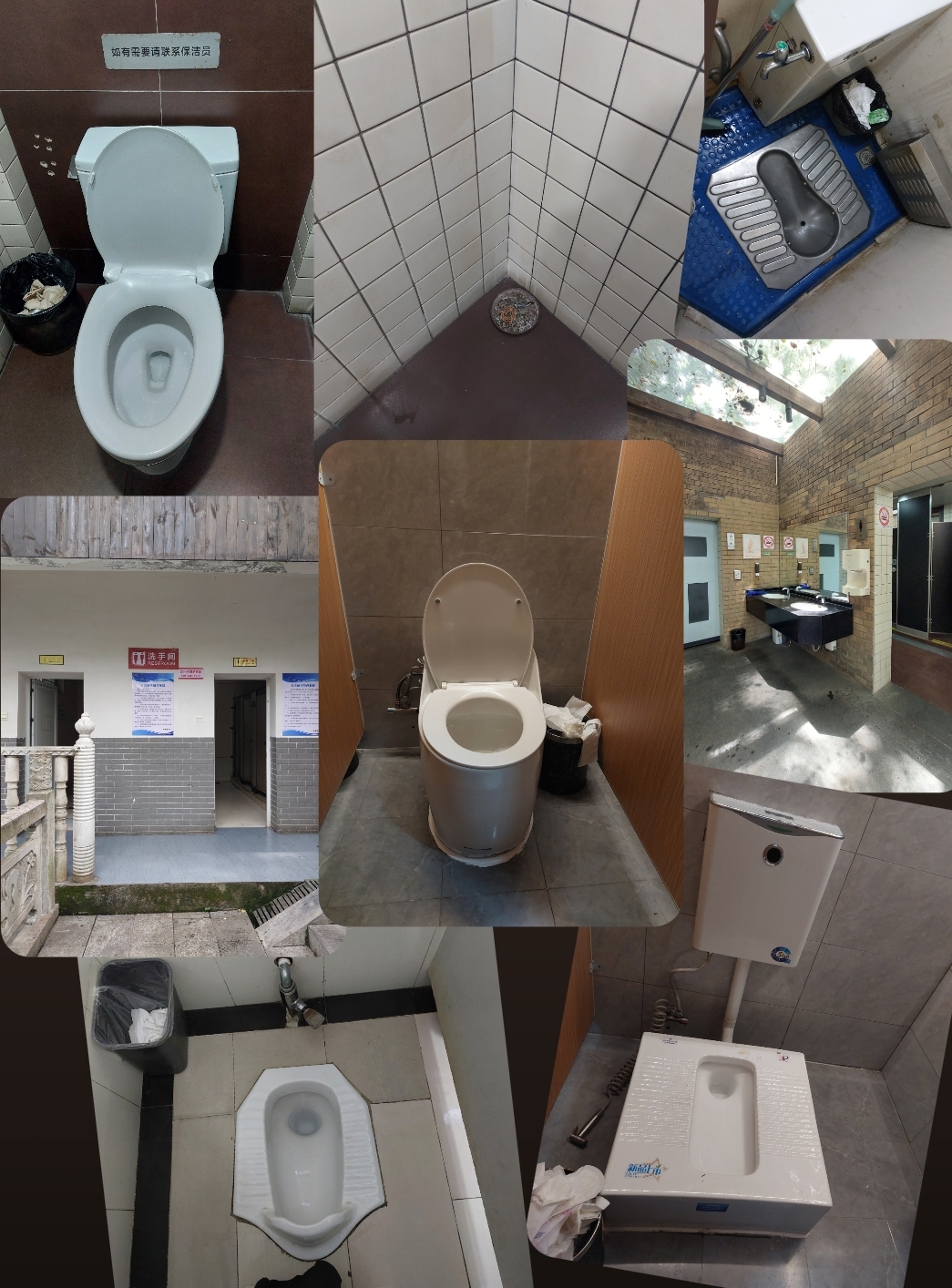
4. Toilet
Now, many people said that public toilets in China were very dirty, with the possibility of having sh*it unflushed and many used tissues on the floor. Well, to be honest, I wasn’t really concerned about it. I have seen it in Europe. And I lived in the US. Come on. But of course, I am prepared.
But guess what? All the toilets that I visited were generally clean. Well of course it’s not the typical sparkling clean you’d see in the 5-star hotel, but the cleanliness was pretty standard if I may say. I mean, some were a bit smelly, yes, some were not that clean, some ran out of tissues, but thankfully I had not encountered ones with unflushed sh*it or many dirty tissues on the floor. Some were actually very clean and did not stink.
Well, I went backpacking in Europe in 2018 and I’ve seen worse: unflushed toilet, smelly, so dirty, and some were not free. So yeah, I think public toilets in China are better. You can find them almost every where. It’s free. Each stall or cubicle has a small trash can. And most of them have the cleaning staff on site. Most of the toilets are squat model (but I’m Indonesian so it’s not an issue. LoL). The only issue I have with toilet in China (and not just the public toilets but also the toilets in the hostels) is the absence of bidet. Out of the 5 hostels I stayed at, only the one in Beijing provided bidet in some of the toilets.
But, oh, please please please always prepare some cleaning wipes or tissues (it’s a must!), or portable bidet if you can.
5. Cleanliness
I think in general the places in China are very clean. Some spots are smelly but it’s really not many. They have cleaning staff every where and every time. Not just in the morning but also at night. Like I said, public toilets are every where. Trash cans are also everywhere. It’s really nice 🙂
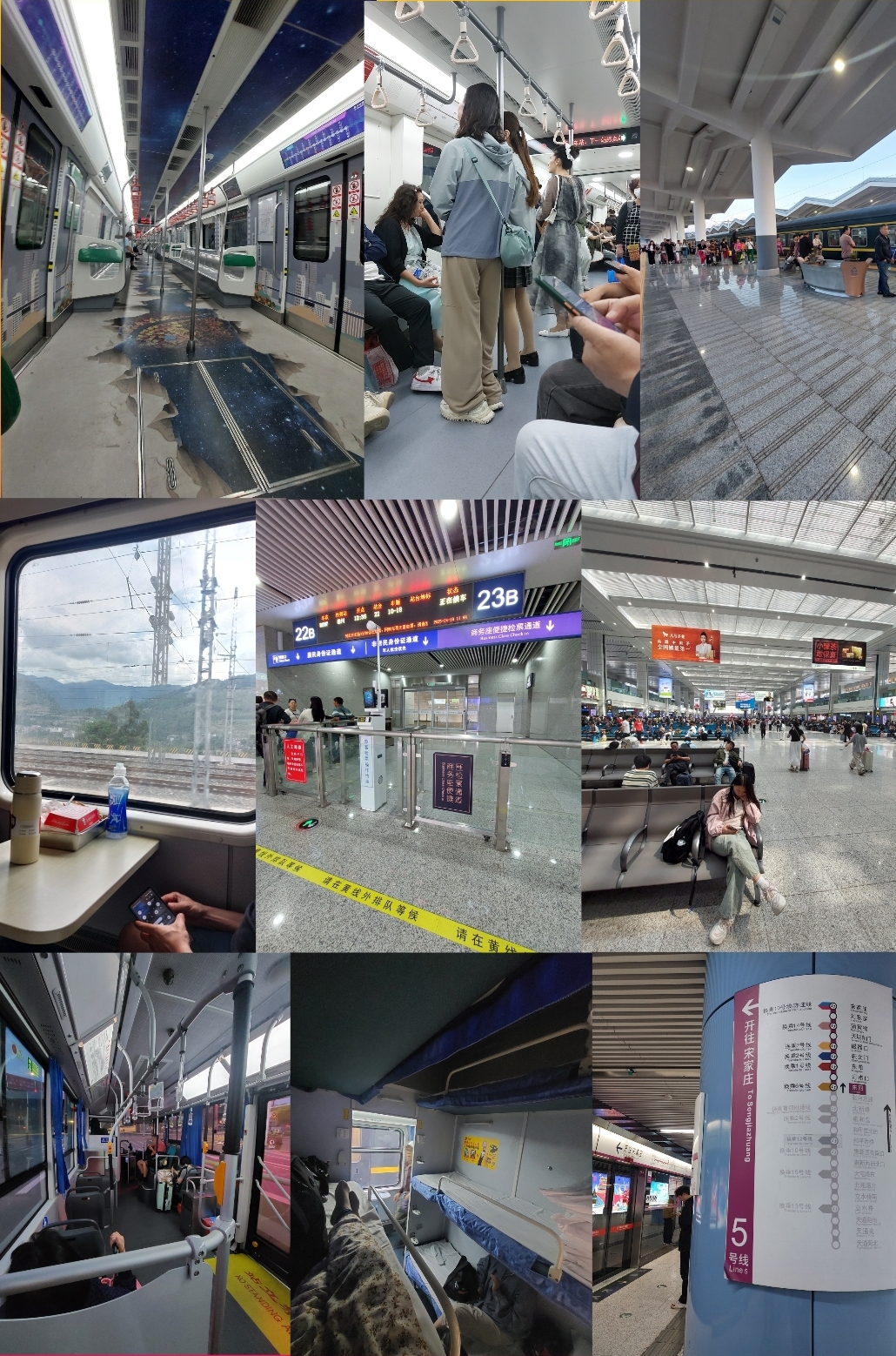
6. Public Transportation
One of the reasons I want to visit China again is the public transportation. It’s really great. I’ve always loved trains in Japan, and I think China’s public transport is on par – if not better. What’s different is the fact that they require us to scan/screen our bags before getting into the stations/platforms. They even check and weigh your water to make sure it’s permissible. It’s quite a hassle, but it’s for everyone’s safety and security, so as long as you don’t carry dangerous/prohibited staff, you should be fine. Just treat it like screening in the airport.
Buses or subways?
I love buses because of its slow pace and cheaper fare, but I often prefer taking the subway/metro trains as I can navigate my way better. I don’t have to be worried about getting lost when going with subways ’cause they provide the signs/directions both in Chinese and English. They also provide the map of the subway network/lines so you know which Line to get on and where you can transfer or get off to reach your destination. It’s really helpful.
Transport Card
In addition to coins/money and postcards, I love collecting public transport cards from the country I visit. I also find it more convenient to use the card. You just need to top it up and then just tap on and off to get on and off the bus or metro/subways. So when I arrived in Beijing, I got myself the T-Union card because it can be used in other cities in China. Alas, while it’s true that you can use it in other cities, you cannot recharge/top it up in other cities than Beijing. So once my balance is up in other cities, I cannot use the card. So sad. Point: make sure to top it up enough to use in other cities. Also, I misunderstood. In Beijing, I could also use Visa card and Master card to tap on and off the subways. I thought I could do the same with subways in other cities. But nope, that’s not the case. I cannot use them.
Railway Trains
If you travel between cities, you might want to try taking the railway trains instead of the airplanes. I always used the trains to travel from Beijing to Xi’an to Chongqing to Zhangjiajie and to Shanghai. Thankfully Trip.com exists so I just made my reservation there. You can choose hard seat, hard sleeper, or soft sleeper. They provide hot water in case you’d like to make some tea or need it for your cup noodles. Once in a while they’ll also go around selling/offering some food or drink. The toilets are standard, not that clean, but not that dirty either. What I want to share is: 1) You can’t check in until around 15 minutes before your train is scheduled to depart. So, in the station, even when you see people queuing forming a long line, no need to panic. When it’s not your time, they’ll deny your entry. Foreigners need to show/scan their passport (no printed ticket is required) to get in to the station and check in to enter the platforms and they have their own line, so no worries. 2) Choose hard sleeper instead of soft sleeper for cheaper option. I tried both and I thought the soft sleeper train would be much better, but alas, I was wrong. The only difference is that hard sleeper cabin has 6 beds, while soft sleeper has 4 beds and a door. But personally for me there’s no difference. I tried Trains T, K, and D. I tried the hard seat, hard sleeper, and soft sleeper ones. And, well, with the hard sleeper, the people in the same cabin were very nice, they even offered me in case I needed to charge my phone (’cause I was in the upper bed, and the power outlet was in the lower bed). But when riding the soft sleeper train, it was really noisy. The kids were crying almost non stop. Continuous talking. Well, I’m not blaming them, and it must be hard for the Mom to travel with their kids alone (where’s the father?!). My point is, soft sleeper train is more expensive but the convenience actually depends on your companions in the same cabin.
7. Mosques
Adding it here because I thought the mosques I visited in China were quite different from those in my country, not just the architecture, which is unique to Chinese culture, but mainly the design(?). I mean, they tend to be scattered or divided into some small/separate units or buildings instead of one united building. What I noticed the most is, the toilet and place for wudhu are usually quite far from the praying halls. (Now that I’m writing this I actually remember that it’s also the case with Ka’bah or Nabawi in Saudi. But, really, it feels different.) Strangely, though, not all mosques have halal restaurants nearby/around them.
7. People
I don’t want to say this but in general, I feel that they are not so nice. And they are so loud including in buses, subways, and railway trains. Also, sometimes I felt like they made things more expensive for foreigners. (This was just my feeling so I could be wrong, ok?) Sometimes I wondered if it’s because I was a foreigner, a hijab-wearing Muslim, or because I didn’t speak Chinese. I just don’t know. What made it painful was perhaps because I loved taking pictures and it’s so damn hard to get people to help taking my pics. I even used Google Translate and showed it to them to make them understand what I needed help with, trying with different words, phrases, and sentences: “Picture,” “Could you please take my picture?” “Take my photo.” etc. but many of them refused saying they didn’t understand. I don’t know if they were pretending or truly didn’t understand. And I know they do have the right to refuse. But somehow it made me sad. I know this can’t be used to generalize that they are not nice. But, well, the heart feels what it feels…
But don’t get me wrong. There are some nice and helpful ones too. Especially the staff in the stations, they’re really nice and helpful. That’s why I want to visit again.
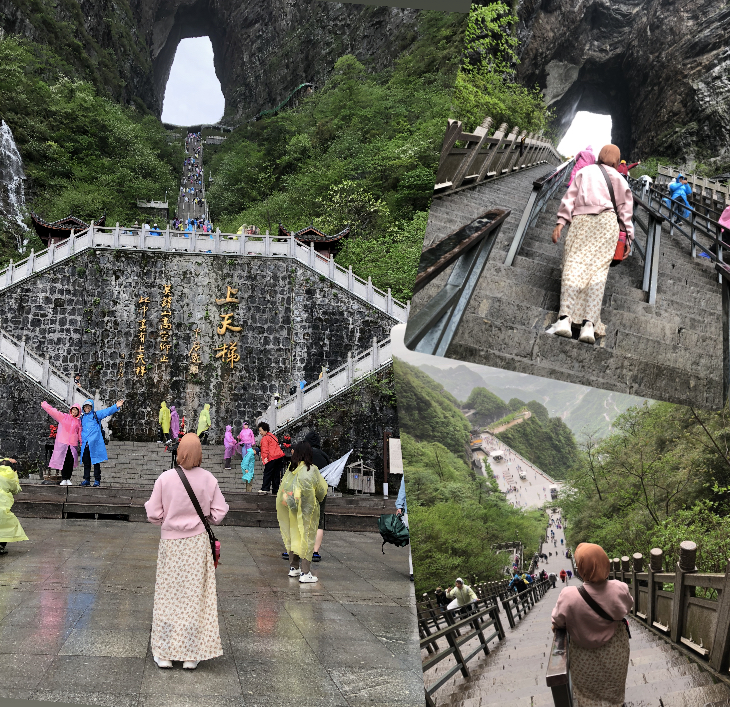
8. Favorite City
My main reason visiting China and Beijing is the Great Wall, but alas, when I went there the wind was so strong. There was something called Orange warning and many tourism spots were closed due to that, including the mosques! The Great Walls tour I booked kept getting cancelled until my last day in Beijing. So I ended up getting a refund. Well, maybe it’s a sign that God wants me to go there again. Hhe I mean, I couldn’t bring myself to go by myself when it’s closed because they did consider the tourists’ safety. Furthermore, I experienced it first-hand how strong the wind was. I was walking on this bridge trying to cross the street. The wind was so strong I was scared I’d be blown away, fell, and got hit by the cars passing underneath. It’s scary.
So when people asked me what my fav city is, it’s Zhangjiajie. I love the breathtaking views of its nature. Tianmen mountain, Zhangjiajie Forest National Park with its Avatar Mountain and all. They are gorgeous!!!
And guess what? When I asked what’s the best season to visit, they said “Now is the best time to visit.” So I guess the weather was perhaps bad only in the northern part of China.
9. Budget
Some people wonder how much I spent but actually I don’t like to answer this question. But I understand that sometimes we need a reference, so perhaps I’ll just share in general. My trip to China cost me under USD $1500. Perhaps not even $1250. And that included all: flight tickets, hostels, food, tours, tickets, local transports, etc. Well, maybe because I wasn’t really shopping, and I did walk a lot. I even walked more than 30k steps in Zhangjiajie, breaking my Taiwan record.
10. Internet
I forgot to add this when I first posted this post. But as you might have heard, you can’t really open Google, Instagram, WhatsApp and such in China because they’re blocked. If you want to access them when traveling in China, you’ll need to either use VPN or roaming service. I myself don’t consider myself tech savvy; I’m not sure how to set up VPN and such. I also read that sometimes even when you use VPN, it still doesn’t work. So when I was traveling in China, I used roaming service from my Indonesian SIM card/provider. In general it worked really well, at least when I needed it. However, sometimes the connection got lost in certain areas like when I was on the railway train, perhaps passing some kind of forest or remote areas.
11. Guide/ChatGPT/DeepSeek
Now you might be wondering how I went about going around China all by myself when I spoke no Chinese and could not read Hanzi. I used ChatGPT! Well, some would recommend you to download certain apps – but if it’s still available only in Chinese writing, I thought it wouldn’t be as helpful and might take more time to really understand the navigation and directions. I did not have the patience, so I simply used ChatGPT. I asked ChatGPT to create an itinerary, give me directions to certain places, etc. The key is in the prompt. I’d write something like, “Please create an itinerary for my stay in Beijing. I’d arrive in Beijing international airport at XX.YYam. I’ll be staying in hostel X, the address is … I’ll stay from this date until this date. On this date, I need to catch train XYZ to Xi’an. I want to visit ABC in Beijing. Please recommend other places nearby those spots so I can visit as many places as possible. Include some halal restaurants and mosques on the way.” Note that ChatGPT uses the data it can find on the internet and sometimes those data are not always right or up-to-date. So sometimes you really need to recheck from other sources and confirm. I’d sometimes write something like, “I’m at Station X, taking Line 3, which exit should I take to go to Y. Do I walk right or left after taking the exit?” Asking right and left ’cause while I’m quite a pro in telling directions in my hometown, I’m helpless and can’t really tell north south directions in other places. LoL And sometimes I’d ask something like, “Do I need to make a reservation in advance if wanting to visit this place?” Etc. Truly, thank God ChatGPT and internet exists. I don’t know how I’d be able to travel on my own without them😳
What else?
I don’t know what else to share. But feel free to reach out or comment if you have questions. I just want to say I’m glad that I visited China. I was happy. I want to visit again some day. Not just Beijing for the Great Walls, but other cities as well. Now it’s time to work, work and work to earn money and save, save, save, and save so I can afford it 🙂
By the way, thank you for visiting my blog and for reading❤️
